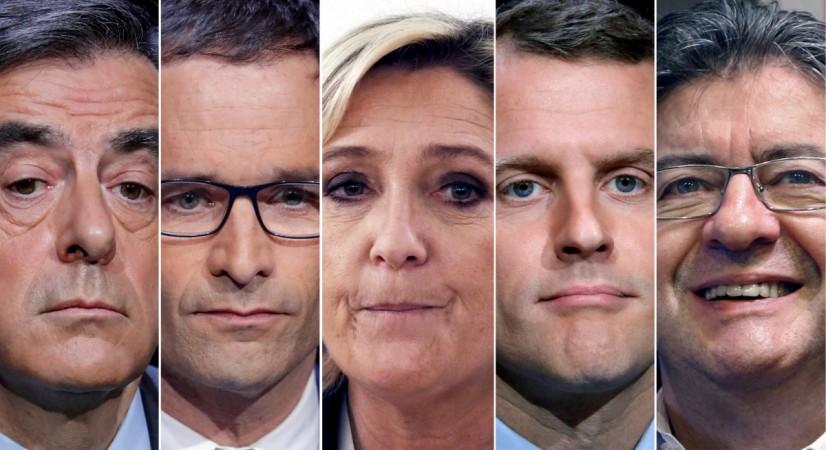
France is gearing to vote for its historic presidential elections on Sunday, which will determine whether the French will succumb to the populist and nationalist wave which resulted in an unprecedented Brexit and Donald Trump's victory in the US elections, or they will take Netherlands' cue closer home of electing a Mark Rutte over Geert Wilders.
The highly-anticipated elections of Europe's third-largest economy would decide whether Far-Right leader Marine Le Pen will clinch the French presidential seat as many polls suggest, or she would lose to popular Emmanuel Macron, a former Socialist economy minister who is running as an independent centrist.
When do the French vote?
The first round of French presidential elections will begin on April 23, Sunday, when the voters will head to vote for 11 candidates.
If no candidate wins more than 50 percent of the votes, which is generally the case, the top two contenders will contest again in the second voting round on May 7.
Who are the main candidates of the presidential election run?
Republican Party: Francois Fillon
Francois Fillon, 63, is France's largest centre-right party's candidate. The former Prime Minister was deemed as a front-runner of the presidential elections, before he was hit by a scandal a few months ago.
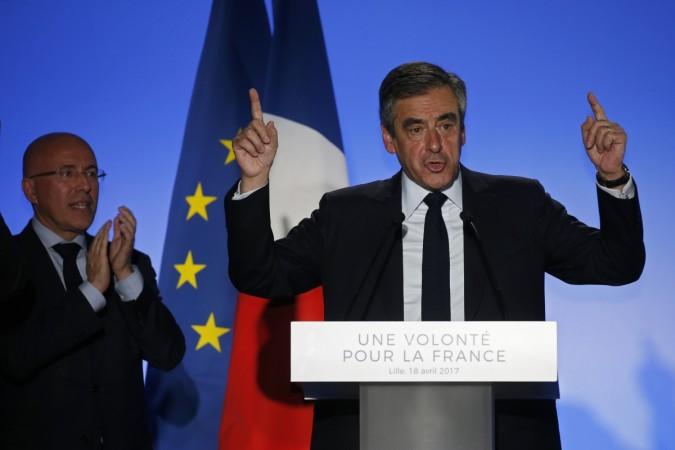
Fillon presented a very alluring figure as a traditional Catholic conservative in the midst of a changing France, and had promised fiscal responsibility and stability in the country. However, his chances of winning the top seat seems dire after a French newspaper published an article alleging that he had paid his wife and children around 900,000 euros (about $948,000) of government money for a job that never existed.
Fillon, however, has pledged to fight on in the presidential elections claiming that he remains undeterred by dirty election tricks. Often called a Thatcherite for his love of Margaret Thatcher's reforms, Fillon has pledged to slash France's flamboyant public sector, which employs more than five million civil servants.
Socialist Party: Benoit Hamon
Hamon, a 49-year-old former education minister, was chosen by the Socialist Party as their presidential candidate, after incumbent president Francois Hollande refused to run for a second term. Hollande is the first president in modern history to opt out of running the second term. His decision to not run, however, has not come as a surprise to many as his presidency has been marked with record unpopularity.
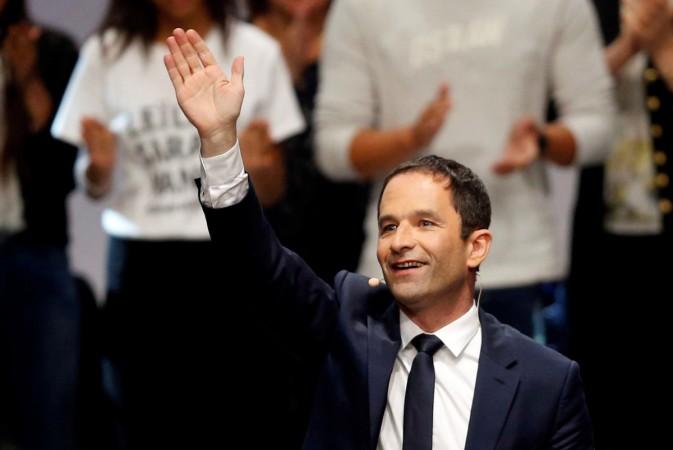
Hamon is a leftist and had defeated former Prime Minister Manuel Valls in the French Socialist presidential primaries. Hamon hopes to stand out against other contenders by proposing radical solutions like a universal income and a reduced working week from 35 to 32 hours. He has also proposed a monthly universal basic income for all.
National Front: Marine Le Pen
National Front, a far-right party, leader Marine Le Pen bears a striking similarity to Donald Trump's populist ideology, and is the most scrutinised candidate in the French elections this year. Polls state that Le Pen could lead the party founded by her father in 1972 to one of its best election results yet.
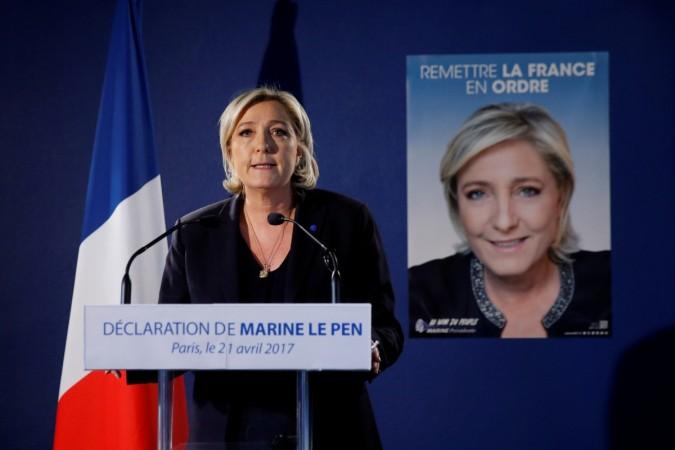
Le Pen, 48, has seen a surge in her popularity over the recent years, especially after a new-found support from young voters and female voters. Le Pen also hailed Brexit and Donald Trump's presidential victory in the US elections last year.
The far-right presidential candidate wants France to pull out of the euro currency and the European Union. She has also proposed severe restrictions on immigration, by slashing it to 10,000 per year while regaining control of French borders and cracking down on suspected Islamist terrorists.
En Marche! Movement: Emmanuel Macron
Emmanuel Macron, a 39-year-old former investment banker, has never held an elected office and wants to break the "complacency and vacuity" of French politics. Macron has managed to become the voice of "radical centrism" in this elections, and hopes to be the youngest president in French history without the backing of any major party.
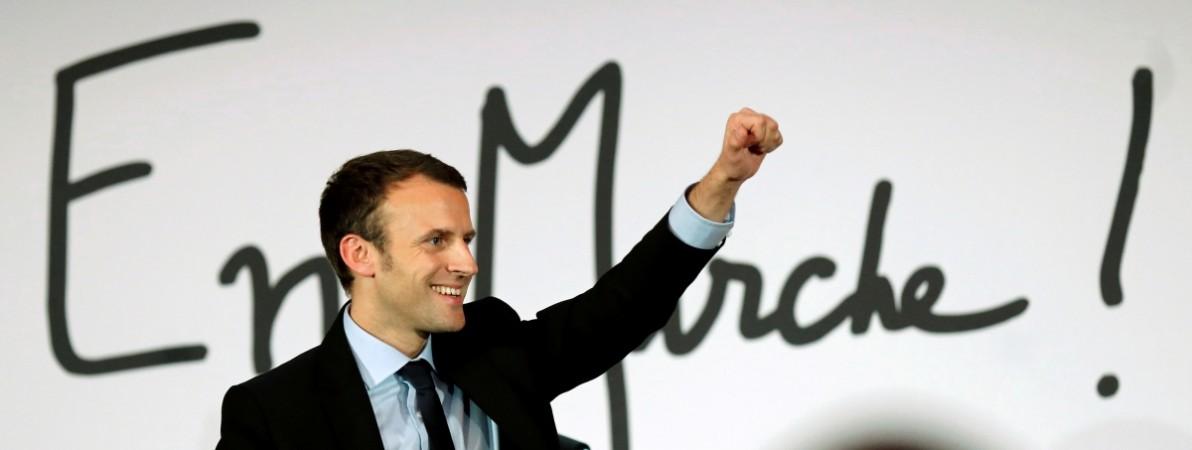
Macron, who was the economy minister from 2014 to 2016, quit the government to form a centrist party and launch a presidential bid as a maverick outsider. The young candidate claims to be neither left nor right, but "pragmatic and fair".
Macron is pro-business, but is progressive on social issues and describes himself as economically liberal. He has gained immense popularity and is at the top of many polls.
Unsubmissive France movement: Jean-Luc Mélenchon
French far-left Parti de Gauche's 65-year-old Melenchon's surge in the polls has been the most surprising facets of the French presidential elections this year. The far-left candidate is running his own Unsubmissive France movement and does not have a backing of any major political party.
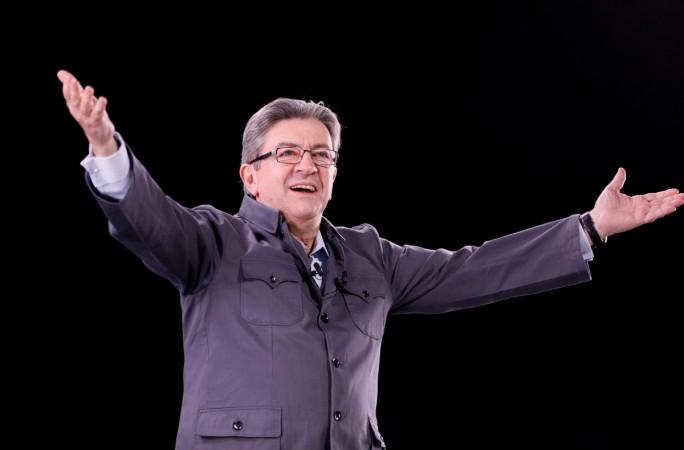
Although, Melenchon has fought the hardest against far-right Le Pen, he shares some similarities with his prime political opponent in the presidential race, including his aversion to the European Union bloc. However, Melenchon does not strike Le Pen's strong anti-immigrant tones.
Melenchon has promised a radical transformation of the country, by reforming French institutions. He has also vowed to raise the minimum age; reduce the workweek to 32 hours; lower the retirement age to 60, and a sharp increase in taxes for the wealthy.
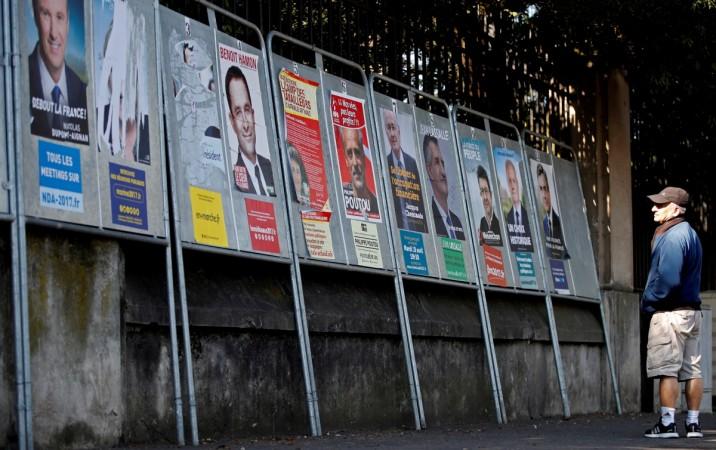
How does the presidential system work?
French presidential elections are conducted every five years, and generally have two rounds unless a candidate gets majority votes in the first round.
To be considered as candidates for the presidency, all contenders should procure 500 sponsoring signatures of elected officials from at least 30 departments or overseas territories. The candidates also have to be French citizens to run for the polls.
First round: All the candidates face off in the first round of the elections, which will be held on April 23. If none of the candidates get more than 50 percent of the votes, then a second round of polls are conducted after 14 days.
Second round: In the second round of the polls, the two candidates with the highest scores in the first round run against each other. The second round of the polls this year is scheduled for May 7. The candidate with the highest vote in the second round wins the presidential seat, and resumes office during an inauguration ceremony held at the Elysée Palace ten days after the second round.
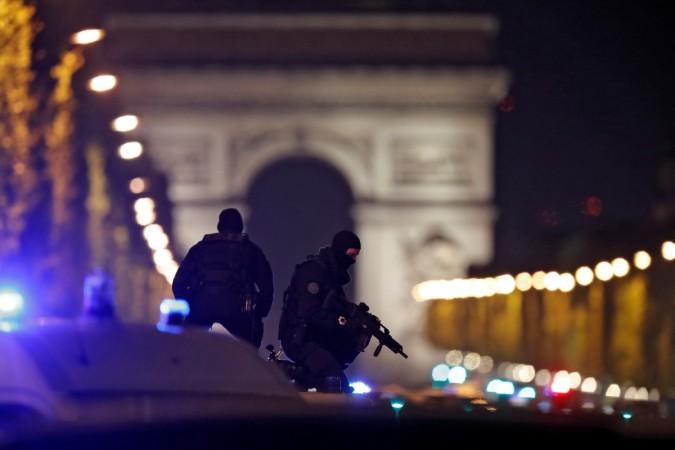
What are the main issues?
Security: More than 250 people have been killed in terror attacks in 2015 and 2016 in France. Terror threats and the issue of security weighs heavily on this year's election, giving rise to Le Pen's anti-immigrant security agenda. Shortly after the shooting in Paris' Champs Élysées, three days before the election, Le Pen held a press briefing calling for all foreigners who identify as Islamist radicals to be deported.
Economy: France's economy has stagnated for years now, as the country is still reeling in the aftermath of the 2008 financial crisis. Unemployment rate in the country stands at 10 percent , which is higher than most of the European Union countries. The voters are looking for a presidential candidate who can provide a financial stability in the country. Labour laws, job creation, taxation and social and welfare provision are one of the most important campaign themes for this year's elections.
Immigration: Some of the candidates, like Marine Le Pen, are banking high on the anti-immigrant sentiments which swept across Britain and United States last year. Le Pen wants to impose strict limits on legal immigration and free movement under the Schengen Agreement. The Far-Right leader has also proposed a Frexit, which could see France leaving the European Union if she wins. Although polls state that many voters in the country feel positive about the European bloc.
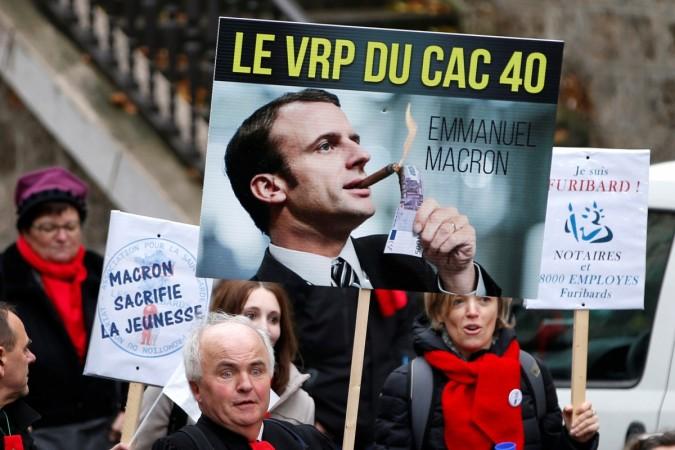
Polls: Who is likely to win?
Recent polls have shown Le Pen and Macron running closely in the first round, with Fillon and Melenchon barely behind them with three and six points. Out of the five main contenders in the first round, only Socialist Party's Hamon is said to be trailing behind at the moment.
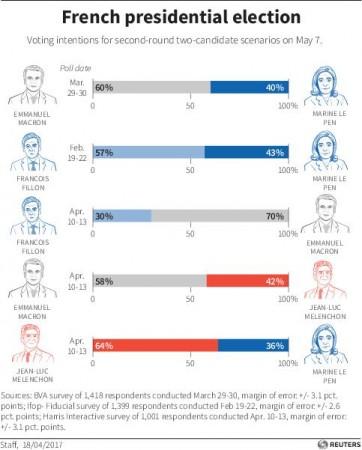
Polls reports state that none of the candidates is expected to get more than 50 percent of the votes in the first round, paving way for a second election battle.
Many polls state that Macron is likely to beat Le Pen in the second round by 20 or more points. However, a lot of changes occur before the second round takes place.
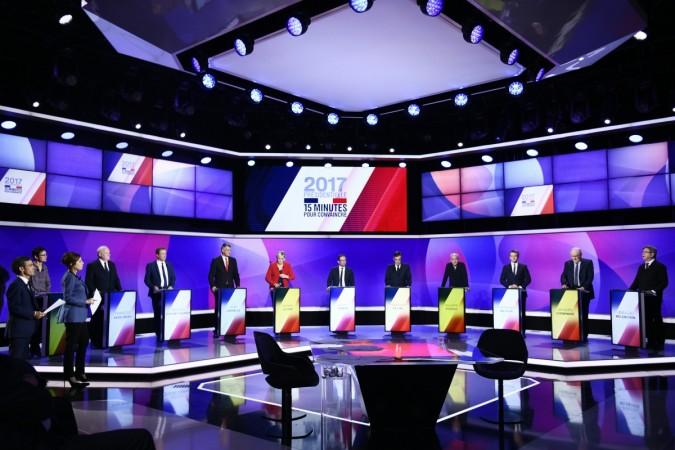
When will the results be out?
For the first round, preliminary results are expected to be out around 9 pm Paris time on Sunday. The expected time of this year's result is slightly late than usual because of the close race between the contenders this year. Usually, the top two contenders of the race become quite clear in the French elections, but this that is not the case this year.
"This is a four way race with the potential for the numbers to be quite close to one another. In the previous elections exit polls have over/under estimated the candidates by up to +-2 percent either way. They correct themselves as the night progresses and typically by 9:30 pm (London time) they are more confident as to the results," Nomura said in a research note.














